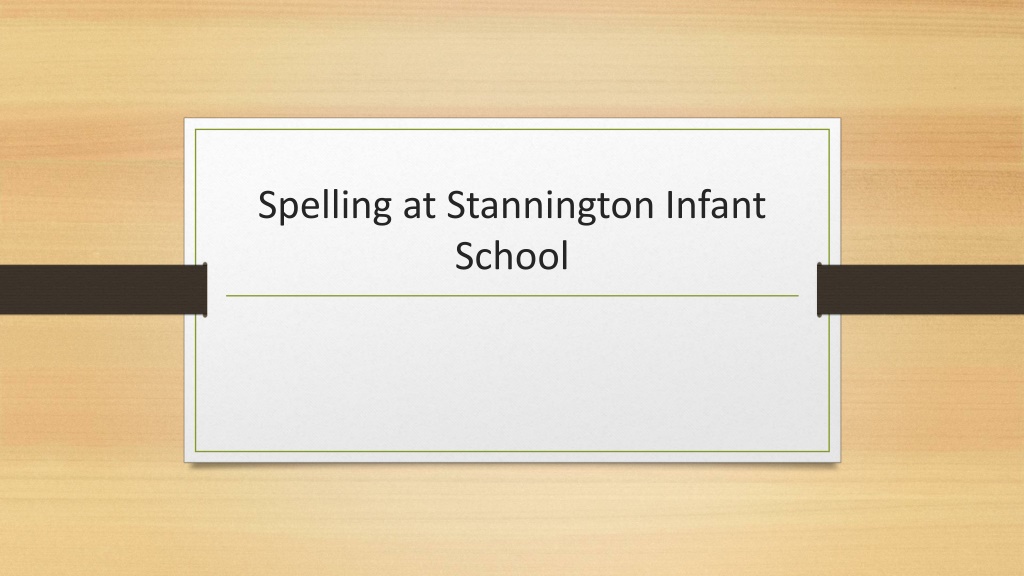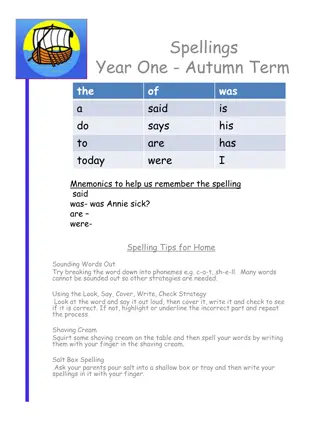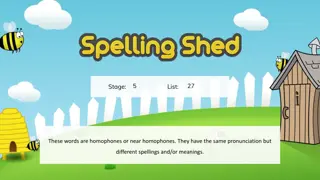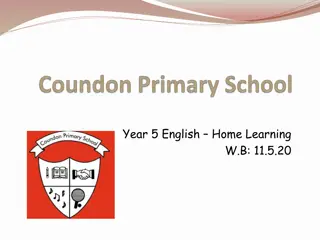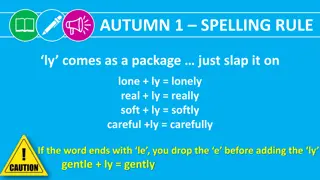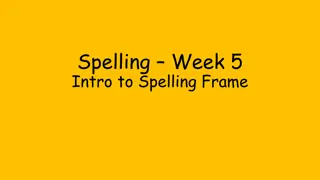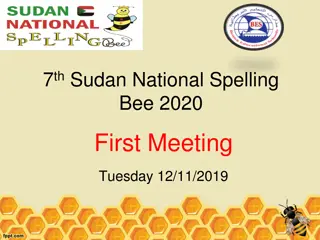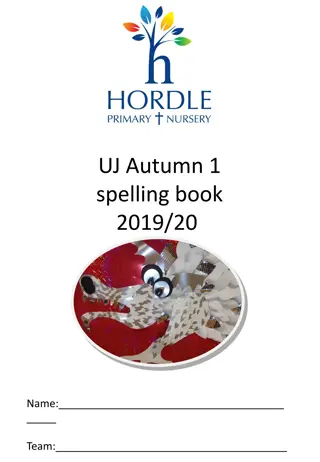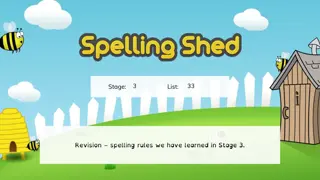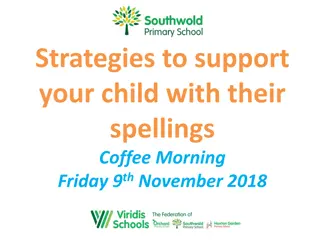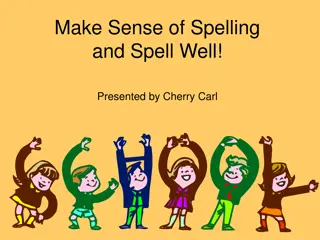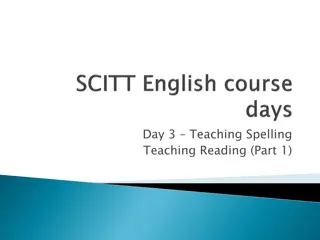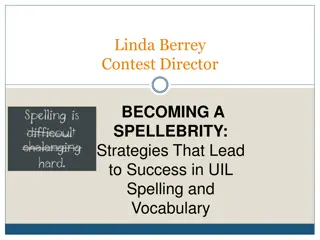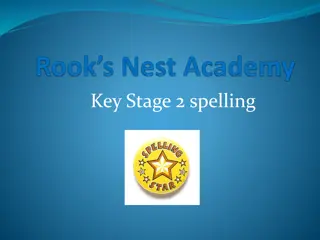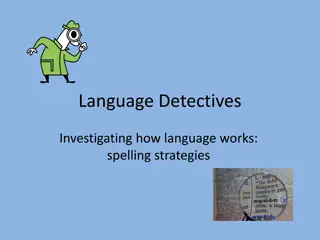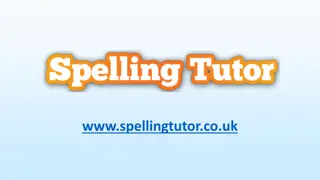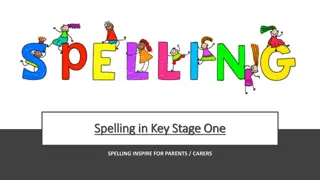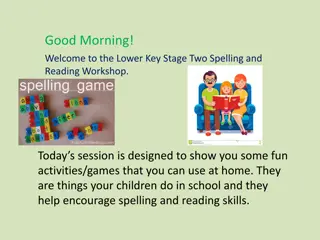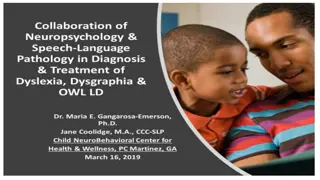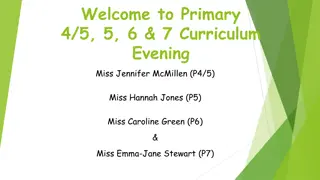Supporting Your Child's Spelling Skills at Home
Enhance your child's spelling abilities with fun games and helpful approaches. Starting with basic words, progress to more complex spellings using phonemes, graphemes, and diagraphs. Encourage letter recognition and word formation using playful activities like letter sorting and circle spellings. Foster a love for spelling in your child through engaging practices at home.
Download Presentation

Please find below an Image/Link to download the presentation.
The content on the website is provided AS IS for your information and personal use only. It may not be sold, licensed, or shared on other websites without obtaining consent from the author. Download presentation by click this link. If you encounter any issues during the download, it is possible that the publisher has removed the file from their server.
E N D
Presentation Transcript
Spelling at Stannington Infant School Being able to spell is an important life skill and part of being a writer. We use the Early Years Foundation Stage and Key Stage 1 National Curriculums for guidance about when and which spellings to teach. We teach spelling as part of our Phonics sessions and our teaching sequence in Literacy. Today is about sharing different games and approaches you can use at home to support our child with their spellings.
Children begin by spelling simple CV words such as it, an, up and in They then move to CVC words: cat , dog , mum and dad . Eventually they will need to choose the correct spellings in each word for a sentence such as I can hear the owl hoot at night.
The language of spelling Phoneme the smallest unit of sound in speech c a t three phonemes l o f t four phonemes Grapheme is a letter or a written number of letters that represent a sound sh ch igh Diagraphs two or more letters that make one sound sh, tr, cl Vowel diagraphs two or more letters making one sound ai ee ew Split diagraph a consonant is in between two vowels made kite bite
How can you help at home? In Foundation Stage we still use letter sounds rather than names when we are spelling: c a t sh e d
Use letters (plastic or on bits of cut up paper) i s t a p n Say a word and ask your child to find the letters to make that word. As they become more confident and their letter recognition develops add letters and extend the words. Focus on CVC words to begin with then CCVC words like: shed shop chop
Circle Spellings Have a selection of words written on pieces of paper. One person holds the words and reads the top word: Happy Next child says the first letter and uses its name: H Next child says the next letter: A Repeat until the whole word has been spelt out. Final child say the whole word again: happy
Spelling Aerobics Have a selection of words written on pieces of paper or on a board that children can see. One person stands in front of the others and chooses a word: Happy (they introduce the word) Then they spell the word a letter at a time using actions H (tall letter action) A (short letter action) P (tail letter action) P Y (tail letter action) Repeat the whole word.
Right or Wrong? ise city sell fansy bisycle mice rise
Silly Stories Tell a silly story using that week s spellings. Each time you say one of the words your child has to write that word down.
Invisible Man A variation on Hang Man! We play in two teams and each time we correctly spell a word we can rub out part of the invisible man. The first team to make their person disappear wins.
Only introduce a few games at a time. When they become bored with it introduce another one. Little and often is the key.
Adding / s /, / es / or / ies / How do we know when to add / s /or / es / when pluralising words? lunch day dog box When do we add / s / or / ies / ? Monkey story lady day
Homophones Put the following homophones into a sentence no by know bye buy bean been through threw new knew their there they re where wear weather to whether too two male mail
Questions? Thank you for your time.
